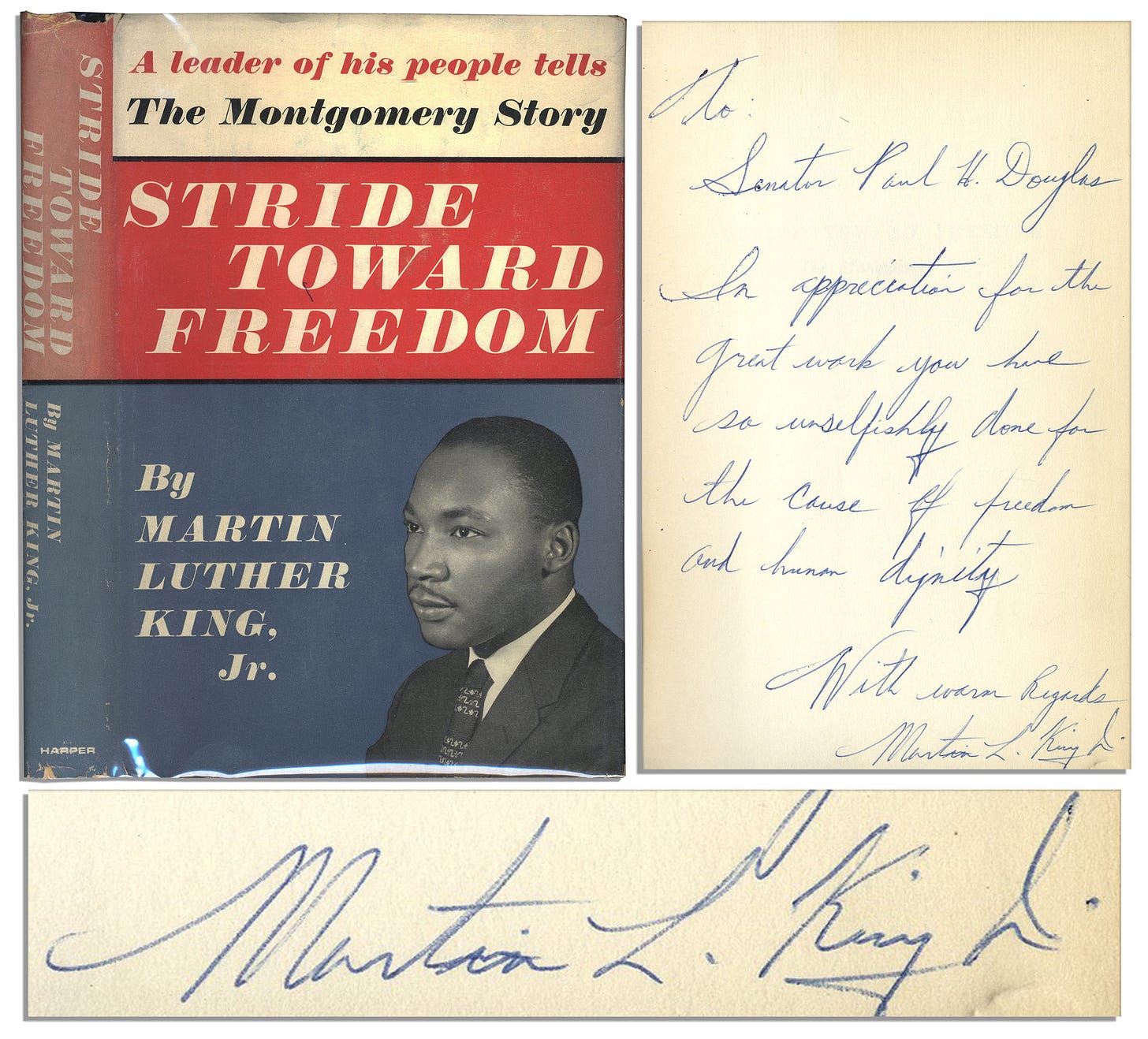Father Twomey's "Challenge to America" on race relations
MLK's "favorite senator" cited the Southern Jesuit's insights in a 1957 civil-rights hearing

Sixty-eight years ago today—February 15, 1957—as the U.S. Senate Judiciary Committee was engaged in hearings on what would become the 1957 Civil Rights Act, Sen. Paul H. Douglas (D-Illinois), in the course of sparring with segregationist Sen. Sam Ervin (D-NC), asked to have two texts included in the record. The first was a message written by the Rev. Dr. Martin Luther King Jr. and issued by the National Council of Churches for Race Relations Sunday (February 10, 1957). The second was “Challenge to America,” an article published in Commonweal (September 21, 1956) by Southern Jesuit Father Louis J. Twomey, SJ (whose biography I am writing, hence this Substack).
Douglas was in touch with King at that time and was among his earliest champions in the political world. Years later, while marching in Selma with Douglas’s wife Emily, King would call him “the greatest of all senators.” Given that King was also in touch with Twomey and had met with him just two weeks prior to Douglas’s speech, I wonder whether it was King himself who suggested to the senator that he juxtapose the Race Relations Sunday message with Twomey’s article.
The King and Twomey texts, which are available online within the text of the hearings (pages 109 to 113), flow together perfectly. Both portray segregation as a sin against the dignity of the human person created in the image of God, and both say that it is the duty of every Christian to work to end segregation.
Adding to the texts’ compatibility is that King, at the end of his message, poses a challenge to the listener:
“We face the hard challenge and the wondrous opportunity of letting the spirit of Christ work among us toward fashioning a truly Christian nation. If we accept the challenge with more devotion and valor, we can speed the day when men everywhere will recognize that we ‘are all one in Christ Jesus.”
Twomey’s article, which begins with the headline “Challenge to America,” seems to plot out an answer to King’s challenge—except that it was actually written five months before King wrote his message. It is evident that the two friends were thinking along similar lines; undoubtedly they forged their bond through recognizing their shared understanding of human dignity and Christian responsibility.
Here are some of the key passages of Twomey’s essay, which the Jesuit wrote while King was leading the Montgomery bus boycott:
The typical southern attitude holds that only in a rigidly segregated society can “the southern way of life be preserved.” … In blind pursuit of their objective “to keep the South a white man’s country,” these misguided southerners are actually inflicting grave injury on the South. …
Even these losses, however, are as nothing compared to the damage inflicted on America. If it is to survive, America must gain the allegiance of the 800 million people, one-third of the earth’s population, who as of now are uncommitted either to communism or to democracy. These hundreds of millions, with their human and material resources, constitute the balance of power in the world today. And of this vast number, the overwhelming majority are colored people. …
Any American, in the South or in the North, who holds to the theory of white supremacy and actively promotes the political, economic and social restrictions necessary to make the theory particularly effective, is in fact undermining this country’s strength in the face of the enemy. It is for such a southerner or northerner to defend himself against the charge of un-American activity.
It is time for all of us to take with deadly seriousness the great eternal truths. There is a God above us, the Creator and Ruler of the world. Every man is made in the image and likeness of God; he is not a mere animal but a rational being with an immortal destiny, vested with a pattern of rights which no one can dare violate with impunity. Every man is a sacred being, more precious than the material world and all the riches thereof; he cannot be made a cog in the collective machinery of an all-powerful state, or a prop to support the white man’s pride of race.
Political society is the instrument in the hands of a free people not alone to preserve law and order but also to take positive means to insure a reign of justice for all its citizens regardless of religion, race, or national origin. For all its serious faults, America has given her people the most equitable form of government in world history. Today we are passing through one of the great turning points of history, and whether men are to be free or slave depends to a large extent on the United States. Do we Americans have the dedication, the courage to think and to live in the spirit of the Declaration of Independence that “all men are created equal and endowed by their Creator with certain inalienable rights’? If so, it is time to prove it. And in the process we will prove to ourselves and the world that democracy is not an illusion.
If you are a Matters Twomey paid subscriber or are among those who supported my work on Father Twomey’s biography A Priest in Good Trouble through Kickstarter, thank you. If not, please consider supporting my work with a paid subscription. Thank you and God bless you.






May you be blessed, Dawn, in Christ and in the presence of our Mother, the Virgin Mary.